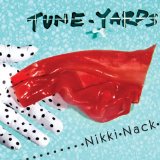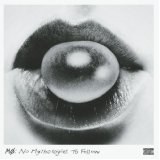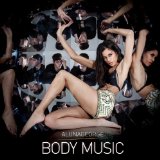 Tune-Yards – aka New England vocalist Merrill Garbus and partner in bass-playing crime Nate Brenner – have allowed some major pop producers, namely John Hill and Malay, access to their already established and almost aggressively individual sound. Concerns of a disaster in the making may ring out; their first album unbelievably lo-fi and the second self- produced – how would makers of albeit alternative but identifiable r’n’b pop affect the truly eccentric and self-sufficient band’s identity? Well, not as you much as you may imagine or possibly fear. There are changes of course as one would expect and also hope from any artist that has been producing music in excess of five years, but these are subtle and even, on occasion, welcome amendments made to the Tune-Yards manifesto.
Tune-Yards – aka New England vocalist Merrill Garbus and partner in bass-playing crime Nate Brenner – have allowed some major pop producers, namely John Hill and Malay, access to their already established and almost aggressively individual sound. Concerns of a disaster in the making may ring out; their first album unbelievably lo-fi and the second self- produced – how would makers of albeit alternative but identifiable r’n’b pop affect the truly eccentric and self-sufficient band’s identity? Well, not as you much as you may imagine or possibly fear. There are changes of course as one would expect and also hope from any artist that has been producing music in excess of five years, but these are subtle and even, on occasion, welcome amendments made to the Tune-Yards manifesto.
2011’s “Whokill” was an astonishing force of nature; it blew everyone and everything that stood in its path away but left Merrill Garbus drained and creatively arid. “Nikki Nack”’s opening lyrics tell of Garbus’ frustrations and the encouragement given to her by a stranger based only on her casual, overheard, singing:
‘You tried to tell me that I had a right to sing
Just like a bird has to fly
And I really wanted to believe him because he seemed
Like a really nice guy
But I trip on the truth when I walk that wire
When you wear a mask, always sound like a liar
I tried to tell him all the reasons that I had never to sing again
And he replied ‘You’d better find a new way’
Garbus’ wide eyed, exclaiming vocals – certainly soulful and often astoundingly powerful – sound pretty much the same on “Find a New Way” as they always did. The change then comes mainly from the songs themselves and Tune-Yards development as writers. Garbus has spoken about her love of sticky, ear worm- songs that attack the brain, embedded forever. One of the objectives she had for this album was to figure out how to write such hooks and incorporate them without compromise of creativity and individuality. Maybe this was the reason for recruiting the producers of, amongst others, Pink, Shakira, Alicia Keys and Christina Aguilera; John Hill and Malay are music specialists who understand how to navigate an artist towards the potential of a great melody. Along with Brenner, the band has again self-written the entire record and this objective of creating catchiness has, on the whole, been met, with many satisfying examples.
The first half on “Nikki Nack” is more convoluted stylistically than the second and also has a lower hit rate. “Water Fountain”, the album’s first single, squashes all of Tune-Yards characteristics and tics into one song. It’s a very tight squeeze; playground skipping rhymes, yelps and ‘yee- ha’s!’, clanging and clattering percussion, exhibitionist vocals and lyrics about a crumbling and under-funded neighbourhoods and a video that references Peewee Herman’s “Play House”. Ostentatious, wacky and be-jewelled, it’s not subtle and, after the initial and undeniable rush has worn off, it’s not enduring either. “Look Around” and “Time of Dark”, both slower tracks, feel longer than their playing time and “Real Thing”, which starts off brilliantly with staccato thrown verses circa “Writing on the Wall” era Destiny’s Child, ends in a tangle of voices and sonic muddle.
“Hey Life” chronicles an existence led too fast accompanied by anxiety and a pressure to cram as much as possible into every waking second; its drumming, synth prods and speed singing all add to the heightened feeling of panic with Merrill central to the ensuing chaos. It’s a minor track in some ways but one that is nonetheless thrilling and manages to avoid any cartoonish inclinations on a track where this could have been an easy temptation.
The strongest section of the album begins with “Stop that Man” which introduces a trio of songs where evidence of growth in song-writing and an ability to apply a more contained but ultimately more rewarding approach is clearly apparent. One of the continued aims of Tune-Yards has been to comment on social and left-leaning political issues with lyrics that are set against predominantly upbeat and dense dance rhythms and beats that imply a celebratory mood. Casual racism, gentrification and sexual harassment are all central themes here and “Stop that Man” questions racial assumptions based on media statistics and news reports and also personal experiences. The song succeeds mainly though by being part angular, glitchy electro clash experiment (it turns inexplicably and temporarily into Blue Monday/ Bobby O for forty-five seconds mid-song) and part glorious, singalong pop song. So if Garbus’ intention was to create a song serious in intention that you’ll also sing and dance along to, she has also again succeeded.
“Left Behind” and the downbeat but not depressing, smoothly r’n’b “Wait for a Minute”, probably the album’s best tune and performance, complete the trio and these moments are some of the finest in Tune-Yards discography to date. There is nothing that rivals the unruly, audacious and already ground -breaking “Gangsta”’ for example, here; the Tune-Yards of “Nikki Nack” are indeed more mannered but also more intricate with one beady eye placed on fine detail and songs that reveal themselves more slowly and reward generously over time. Claims of cultural appropriation, for they have been made, are surely overblown and only on the multi harmonies of the lullaby-like “Rocking Chair”, short and little too on the nose, does the intention grate. Other influences can also be heard, Laurie Anderson, Cyndi Lauper, Missy Elliott and Timbaland, Santigold, Big Boi, MIA and Neneh Cherry in particular all register at certain points but never once could you mistake Tune –Yards for anyone else. “Nikki Nack” may not shout its intentions as loudly as before but its power is found elsewhere, you’ll find yourself madly singing its merits – probably unaware and almost certainly with glee.
 On paper at least it would appear that MØ is unlikely to deviate much from what is a well-established and superior brand of Scandi-pop. With this album being three years in the making, the Copenhagen based twenty-five year old has had time to hone her preferred blend of r’n’b pop with trap leanings and an occasional wander into 1960s reverb-heavy girl group territory. Her competition is undoubtedly strong; Lykke Li, Annie, Robyn and Oh Land to name a few of the female singers who have already demonstrated their worth in the genre over the last decade. But MØ can thankfully hold her own more often than not on this, her debut album, “No Mythologies to Follow”.
On paper at least it would appear that MØ is unlikely to deviate much from what is a well-established and superior brand of Scandi-pop. With this album being three years in the making, the Copenhagen based twenty-five year old has had time to hone her preferred blend of r’n’b pop with trap leanings and an occasional wander into 1960s reverb-heavy girl group territory. Her competition is undoubtedly strong; Lykke Li, Annie, Robyn and Oh Land to name a few of the female singers who have already demonstrated their worth in the genre over the last decade. But MØ can thankfully hold her own more often than not on this, her debut album, “No Mythologies to Follow”.
Album opener “Fire Rides”, one of the new songs which represent the minority here, as over half the album has already been released, is a perfect introduction to MØ’s style and sound. Following a near acapella flurry of swooping, angelic vocals, stop-start post Timbaland beats hit hard against the melancholic melody line before a rave synth adds another, more angular dimension to the chorus. It may sound crowded but it’s a sublime merging of styles. Most impressive of all though are MØ’s vocals, full bodied and soulful with an impressive and expressive range that her contemporaries can’t match. The apocalyptic metaphors on “Fire Rides” are bought to life with her possessed performance on the haunted and yearning verses:
‘What’s it gonna be with the violence?
What’s it gonna be when the fire rides in?
What’s it gonna be when the sound of you and I die out?’
“Maiden”, “Pilgrim” and “Waste of Time” are all previous singles and further represent MØ’s fixation with the music she grew up with. Much like Grimes, contemporary futuristic r’n’b and hip hop have been essential influences to her along with electronic pop music and an ability to subvert these genres subtly and without irony but with heart; this is her specialty. “Maiden” introduces a classic nylon-strung guitar sound that crops up more than once in the album’s playing time and it’s to her credit that she applies these odd stylistic flourishes to her sound and makes it something that is identifiable to her and without contrivance. Producer superstar Diplo appears on the brassy and low-slung “XXX 88” and it’s maybe not surprising that it’s the most commercial moment here but also completely in keeping with the sonic themes of the album. “Don’t Wanna Dance” and the slowly chiming “Never Wanna Know” in particular pay a brilliant homage to Motown and girl group dilemmas and sonics. Both tracks are wonderfully conceived and a perfect for MØ’s longing and alienated vocals, “Never Wanna Know” has a divine spoken interlude that draws the line from The Shangri-Las to All Saints, it may be an easy pull but it certainly hits in all the right places
‘All of a sudden I was brain dead and rotten
With thoughts of you and I
And I wanted to ‘goodbye’ you
But the nights are so cold
How I missed your human soul
I would never let you go if I’d been a little older’
he less successful songs here, and there only a few, are also the newer ones. “Red in the Grey” has a pretty straight forward trap arrangement but is more of a re-tread of earlier material rather than a fresh update. “Dust is Gone” continues with the sixties thread but the lack of a strong song and Lana Del Rey aping render it redundant karaoke. The clanking and clapping “Walk this Way” and the gorgeous “Slow Love” with its opulent, misty funk fare much better. Compare any of these tracks though to the older and eccentric “Glass”, the closing song here, with its deeply disconcerting festive synth hook, massive pop chorus and general oddness, and these tracks fail to fully measure up.
“No Mythologies To Follow” may not be as instantly gratifying as one may have expected given a genre that all too often and easily is written off as disposable. This is an album that initially is difficult to warm to and a fairly steady mid tempo throughout can provoke a feeling of sameness. This proves to be a strength as opposed to any kind of weakness however as repeated listens reward enormously as buried melodies and hidden embellishments are excitingly revealed over time. MØ has already managed to establish her own style and found a voice which allows her access to the hallowed music hall of Swedish Pop (a copy of Abba’s “The Visitors” is given to all wannabes as homework) but she also cleverly sets herself apart from her contemporaries effortlessly and with some aplomb. MØ is indeed something quite special: an awkward and talented woman challenging her inhibitions and desires through frequently beautiful and slow burning music that is, at times, equally awkward.
 AlunaGeorge have already achieved an incredible amount in a very short space of a time. It’s less than a year since their first official single, the haunting and sonically ever shifting “Your Drums, Your Love” (also the best thing here) and London-based Aluna Francis (vocals) and George Reid (production) have already created a ‘sound’ that is instantly identifiable as theirs. In that respect they are more on a par with the R’n’B super producers of the late nineties/early noughties who were less successful with their own projects (see in particular the early solo albums of Timbaland and Pharrell Williams with N.E.R.D.) but had a sound that was undeniably theirs and hugely desirable to other artists, mainly because it sold by the cartload and it also provided some cool when it was urgently required (Britney, Justin and any other Mouseketeer I may have missed out). It’s the other way around with AlunaGeorge and their success is with their own band rather than work with other artists, at least for now ; unsurprisingly the remix requests already appear to be coming in thick and fast (listen to their work with US hipster idols Dirty Projectors on “The Socialites”).
AlunaGeorge have already achieved an incredible amount in a very short space of a time. It’s less than a year since their first official single, the haunting and sonically ever shifting “Your Drums, Your Love” (also the best thing here) and London-based Aluna Francis (vocals) and George Reid (production) have already created a ‘sound’ that is instantly identifiable as theirs. In that respect they are more on a par with the R’n’B super producers of the late nineties/early noughties who were less successful with their own projects (see in particular the early solo albums of Timbaland and Pharrell Williams with N.E.R.D.) but had a sound that was undeniably theirs and hugely desirable to other artists, mainly because it sold by the cartload and it also provided some cool when it was urgently required (Britney, Justin and any other Mouseketeer I may have missed out). It’s the other way around with AlunaGeorge and their success is with their own band rather than work with other artists, at least for now ; unsurprisingly the remix requests already appear to be coming in thick and fast (listen to their work with US hipster idols Dirty Projectors on “The Socialites”).
The AlunaGeorge sound is maybe best described as fluid and ‘watery’ (even lyrically ‘I’m treading water for your’ on “Your Drums”, “Diver”), adjectives like shimmering, skimming and plopping immediately come to mind and this is combined with a harder, more disjointed sound of pitched cut-ups of Francis’ voice or an isolated synth line with the genre firmly established as r’n’b and highly polished, late nineties British two-step and garage. In addition to this, with the most successful example being the fantastically snarling “Attracting Flies”, there are out and out pop songs where Aluna sounds like an urban Lily Allen (Allen not actually being urban, but don’t tell her that). Aluna Francis’ voice is what’s best described as youthful. She can at times bring to mind a slinky Aaliyah, see in particular the excellent slowie “Friends To Lovers” which is the most mid-90’s indebted American R’n’B track here ( I won’t mention the Montell Jordan cover version of “This is How We Do It”, quality control alert!), but on the poppier tracks it’s high-pitched and pushy. It’s not a live voice necessarily but it’s a very engaging and charismatic studio one.
Tracks like “Diver”, one of the half-dozen tracks heard prior to the album’s release, use the cut-up, sped-up and disconcerting vocal effects to create an additional hook and mood (their best tracks are all about creating a mood) that is equal to the strong melodies already contained within the song. This is undoubtedly their strength but is also where “Body Music” on occasion sags with the misuse of this formula. If the song-writing fails, as it does on occasion, then it seems the more manic and overwhelming these effects become as if to make up for, or distract from, the lack of a conventional tune. A case in point being the whizzing, stutter splutter of “Best Be Believing” which struggles in vain to locate a noticeable chorus and the lethargic but intermittently hyper title track. “You Know You Like It”, the oldest song here, pumps and throttles away for four minutes, however, and is an astounding track that production-wise you would have been pushed to find in the UK even five years ago. This is changing now of course with the likes of Rudimental and Disclosure (complete with a high profile feature from AlunaGeorge) also releasing high quality but uneven, bass and garage debut albums this year but they can’t yet compete with AlunaGeorge’s sonic niche.
There’s no doubt that half of this album is brilliant and it’s most certainly the first half. The concern for AlunaGeorge will be where to go now with their sound. The weaker tracks here are the newer ones, and if like me you’re listening to the deluxe version of “Body Music” which has 19 songs, no remixes, you will be familiar with the concept of repetition of a successful formula to the point where you’ve nodded off. There is talent here and originality, not easy things to come by at any period in contemporary music regardless of what some may tell you. If AlunaGeorge can continue to make music that keeps them interested, music they would listen to, then this is a duo could become one of the most influential and important acts the UK R’n’B scene has experienced for a long time, in the meantime this will do nicely.


